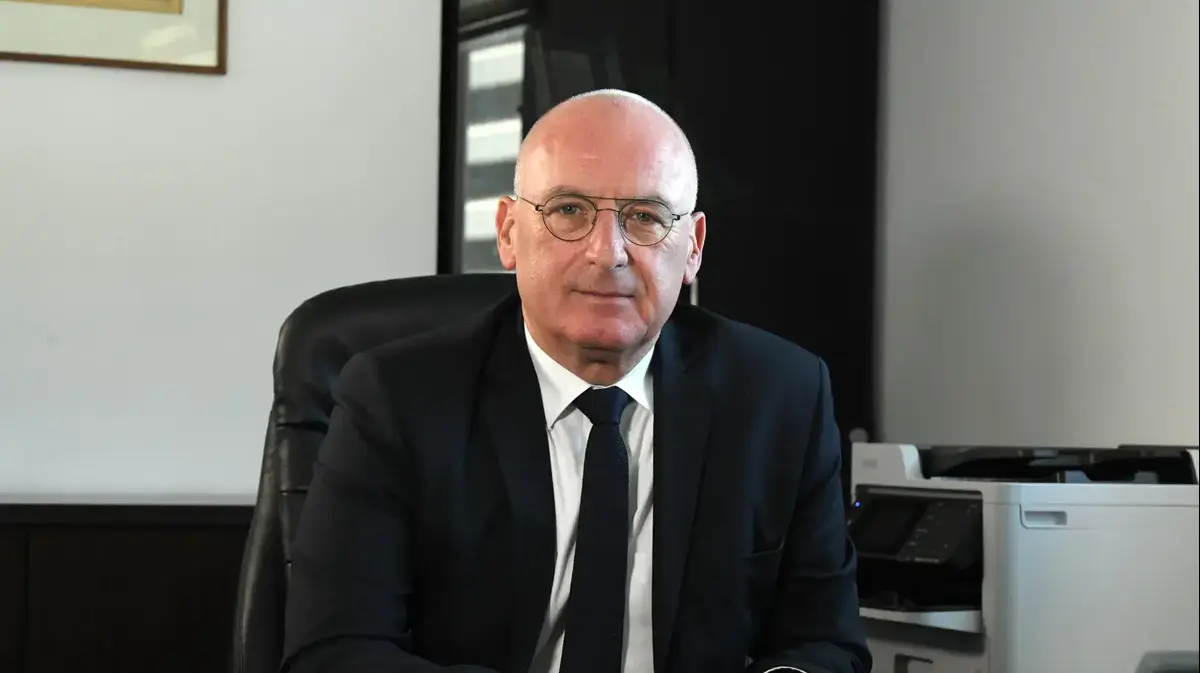The next finance minister?
Personal interview with Yair Avidan, the bank supervisor
Yair Avidan, the supervisor of the banks, is not targeting the Ministry of Finance, but to the suggestion that Netanyahu might be appointed to the highest economic post in the system, he says "Never say never".
In a personal conversation, he explains his decisions as a supervisor, answers the accusations that he is too polite towards the banks and also refers to the real estate turnover
Liat Ron
09/29/2022
Thursday, September 29, 2022, 11:48 a.m. Updated: 5:12 p.m.
Share on Facebook
Share on WhatsApp
Share on Twitter
Share by email
Share in general
Comments
Comments
Yair Avidan, the bank supervisor.
Not aiming for the position of Minister of Finance, but adds: "Never Say Never" (Photo: Reuven Castro)
The 91-year-old mother of Yair Avidan, the supervisor of the banks, does not understand exactly what he does, but knows that he works at the bank.
From time to time she asks him, "Yairel, what's going on in the banks?", and he answers her that everything is fine, "When they lose, mother, you will also lose and when they win, you will win."
This statement, which came to reassure the elderly mother, that her money is in safe hands, is very far from the day-to-day reality experienced by bank customers.
When the supervisor's mother puts money in a bank deposit, not only does she not earn, she even loses because of the zero interest she receives.
On the other hand, the banks in Israel make a lot of money precisely because when they make money, the public does not necessarily make money.
.
Partners only in losses
Avidan was called to the matter of the "deposit taker" following the protest that flared up quickly, and discussed exactly this question: why only the banks benefit from the increase in interest rates.
In response, he sent them a restrained letter, in which he made it clear that he expected them to pass on the interest rate increase to the customers.
The reviews were not long in coming.
Instead of taking a determined and combative approach, it seemed that the inspector was once again politely asking for what should have been demanded immediately, including the imposition of sanctions on those who improved the instruction.
Once again, the feeling arose that the bank supervisor cares more about the banks than the customer base.
Those who know Avidan know that this letter characterizes him: calculated, restrained, weighing words, advocating understatement.
He is a big believer in the saying "He who goes slowly comes in time" and upholds it not only professionally but in practice.
At the age of 63 he managed to walk the Israel Trail, the "Mont Blanc" and the "Camino Primitivo".
"You mustn't stop walking, he says, "you have to keep the right rhythm.
I prefer to manage life with a reasonable effort over time.
It is also related to my role as a supervisor.
Persist in thinking, be relevant, professional, leading and innovative.
"The state world is very important to me. Especially in the contemporary culture in Israel. It seems too civilized to the public, but the supervisors understand very well what I mean. There is a difference between a directive and an expectation, but in practice it will be almost the same practice."
Only that expectation is not enforceable.
It can be ignored.
"We are dealing with climate change and there is an expectation for the system to be ready and prepared for extreme scenarios, and everyone works with all their energy. Not everything needs regulation. The great success will be for the system to independently learn to be fair. Regulation enters in places where the system has not done well to fulfill what is expected of it. They understood You get the hint well and by the way, I doubt if there was a market failure here."
Aren't the banks supposed to raise the interest rate on deposits?
"In the economy, there is demand and supply, and money has a price. The Israeli system in the post-corona period is very liquid and I expect to roll the cost of interest to the benefit of the customer, but also in other developed countries in the world, due to the excess of liquidity, the situation is even worse than ours. Despite this, my opinion does not rest on the matter and we are looking at This is in a broader view - to see the consumers and customers at the heart of the matter. The banking system will have to understand that it provides service to customers and supports them with the services it has and does not take advantage of their behavioral biases.
"I want my mother and yours to know that they are getting the best product that suits them.
My mother is 91 years old and I am worried about how to find the solutions that will protect her."
The bank gave my mother an interest rate of 0.06% on a monthly deposit. She was sure that the bank was looking after her until she realized that he took advantage of her innocence.
"The things you say are extreme. The bank gives customers confidence that it keeps their funds. My mother is not looking for a return, she wants to know that she can get her money when she needs it. But we want to transfer the power to the consumer. For example, in the open banking reform that came into effect not long ago , and allows the customer to use his information asset and give it to third parties
.
Also in deposits we intend to publish the interest rates and in addition the credit that the banks give.
Here is the place to say that the customer also has responsibility for his financial management.
We are facing three major challenges: financial education, digital literacy and information literacy."
"The customer also has responsibility for his financial management" (Photo: Reuven Castro)
a new language
For those who do not master the banking idiom, we will explain that the inspector means three areas in which the average Israeli customer repeatedly fails.
Because we never received a financial education, that is, from those whose parents educated them to deal with money wisely and to be wise consumers, he does not understand basic economic terms and when he encounters a wall of obscure and tiresome words, instead of improving attitudes towards service providers, keeping his money and even making a profit, he runs away and lets them do whatever they want with his money.
Digital literacy means knowing how to operate through applications, computer websites, the information display and the bank's ATM.
The younger generation does it naturally, but the adults are dragged behind and wait hours for a telephone answer, which is also not always welcoming.
Information literacy is our ability to search for data, know how to read, analyze it and make informed decisions.
Again - too few of us have once read their bank ID for example, a collection of data that can determine whether your loan application will be accepted or rejected.
"One-Zero makes the traditional banks train their muscles for the competitive environment" (Photo: Reuven Castro)
Big Brother
To the question of whether the Bank of Israel is responsible for the financial education of the citizens, Avidan says that the responsibility is not his, but the State of Israel's.
"We are happy to help, but the authority is not in our hands. Together with the local government, we did a project that focused on the Arab, ultra-Orthodox society and among the elderly. In my eyes, the critical mass should come from the Ministry of Education."
78% of the activity in the branches is going digital and entire populations are not in the game.
My mother is unable to operate an app.
There is a significant challenge here.
At the branch level, today there are 1,000 branches in Israel, when at the peak there were 1,200, which means a 20% decrease.
The banking infrastructure for the elderly is available, but complex.
There is a voluntary agreement of the banks to give priority to the phone and reach the homes of the seniors."
Why do you only "expect" the banks to pass on the interest to the customers and do not demand that they do so, otherwise they will be punished?
"Because regulators in the developed western world do not interfere with financial banking instruments, certainly when there is a wide range on deposits for different periods. When there was a uniform price, they say there is coordinated banking, when there is a range - that is also wrong. After all, it is possible to set interest rates, to be the 'big brother,' To manage everything and completely eliminate the competition."
The problem is that there is no real competition here, because the number of banks is very limited.
"In banking systems that have hundreds or even thousands of banks, such as the USA and the UK, the interest rate rollover is lower than in Israel and the central bank does not intervene.
In England, four banks hold 68% of all accounts and there are thousands of banks there.
It is true that when there are more players there is more competition and it is important to us that more banks enter the system.
The last bank established before 'One Zero' was in 1978. There is another digital banking initiative on the table, which will be launched in the coming year.
" "One Zero" managed to shake up the market a bit.
"Certainly. It makes the traditional banks train their muscles for the competitive environment, because there is a 'potential disruption' here. There are many hundreds of digital banks in the world, a minority of them are profitable, but they rise, develop and create an innovative model, even if it takes them a while to reach the point of balance, They make the other banks respond."
Two years have passed since the credit cards were separated from the banks, following the conclusions of the Strom Committee, a move that came into effect at a problematic time in dealing with the corona virus.
Can it be crowned a success?
"The Strom committee created a positive and important momentum for competitive thinking between the banks. Two credit card companies were separated and the separation of the third, like Discount, is being examined. Because of the effects of the corona virus, it will take time to measure in a clear way how much this has affected, but in some indicators we can definitely see progress."
"The Strom Committee created a positive and important momentum for competitive thinking among the banks" (Photo: Reuven Castro)
Refueling the mortgages
Two years have also passed since the Bank of Israel's decision to remove the restrictions on the mortgage mix, and to increase the prime interest component.
In retrospect, you also have a hand in fueling real estate prices.
"We wrote one of the most conservative approaches in the world, in all that concerns mortgages, in two ways: the maximum loan amount in relation to the value of the property and the repayment amount in relation to the salary.
We have the lowest amount of arrears in mortgage payments in the world and during Corona, the banking system spread out the payments."
The banks did not volunteer to spread out the mortgage payments, the state helped them. People took out mortgages at prime interest rates and when the interest rate in the economy rises, their mortgages also jump up. They will lose everything they have It's up to them if they don't meet the payment repayments, not the banks. They won't be hurt.
"The stability of the banks is important. We assure our customers that those who need to receive their money will receive it, unlike in Lebanon who come armed with a gun to the branch to receive the money that belongs to them. Happily, we are far from there. When the level of inflation and interest rates rise, the level of risk increases and it is possible that the failure will increase on a small scale. Every household that goes into failure is painful. That's why the system performs sensitivity tests, in order to make sure that throughout the days of the loan, every customer knows what the first payment will be, what the total monthly payments are, paying attention to the forecast of interest and inflation, and then the household can check whether this puts them at risk."
This does not solve the equation, that when interest rates rise, mortgage prime payments rise.
Did people not expect the interest rate increase?
"I'm not defensive. But the other side of the coin, not the whole world is Japan, where for decades the interest rate is zero. What may not have been at the best time, it was important, and not my best problem, was the release of the prime limit in 2020. We saw and I still see This is a positive thing, it allows households a loan with greater flexibility.
On a representative mortgage of one million shekels, the prime component increased by another 10 percent, they took another 100,000 shekels in prime interest, which means that a household will pay about 200 shekels a month, but thanks to this he got an apartment , compared to the alternative of not buying an apartment or paying rent. I want to emphasize that the main element in the increase in housing prices is the low supply, the bureaucracy, public transportation infrastructure and the accessibility of the periphery to the center. In the economic world, it is true that demand produces an increase in prices.
There is always a failure when taking credit, today the failure is low and most of it, when the borrowers sell the property themselves, it is done more conveniently and at a better price.
When the interest rate environment rises, the level of failure will rise, perhaps to the extent of 5000 - 10,000 apartments.
As the inflation environment returns to its target, it will moderate."
The banks' profits are enormous.
"The rates of return are certainly high, and they are quite similar to what we see in European and American banks, some as a result of post-Corona, and some from taking advantage of the inflation and interest rate environment.
60% of the banking system's capital is index-linked, it is not the citizen's account.
"When the interest rate rises, the banks enjoy a higher producer surplus that is not passed on to the customer, it may be reasonable that the inflation and interest rate environment increases, failure rates will rise and credit losses will rise. I predict that the yield rates will drop from 155 to around 12%. This will be reflected in benefits, services , commissions and prices for the consumer. And when the banks distribute dividends, the citizens will also benefit from them through their investments and through their pensions."
I quote a headline published in one of the sixth columns: "Yair Avidan conveys a message to the system, a message that was well received: he wants to be finance minister in the Netanyahu government."
Do you want to be finance minister?
"I am not a political person but a professional, doing my job, trying to do the best I can in my shift, even in the world of inclusion, fairness and accessibility. I am close to the halfway point of my term. I have all the strength to carry out my mission. When I received the request to serve as a supervisor, I was already halfway through Pension. I hesitated. The eldest son and my wife told me, you have been talking for many years about giving and donating, this is your opportunity to contribute, go up to Jerusalem and do what is necessary."
This is not a jump to a political position.
"Absolutely not. But 'Never Say Never' is about nothing. I also didn't think I would play the role I play today. Whatever happens will happen."
Of money
Tags
the supervisor of banks
mortgages
Minister of Finance
banks









